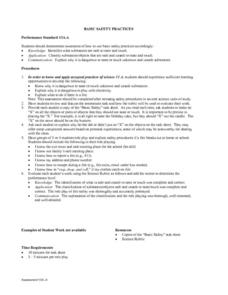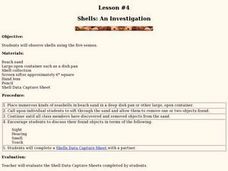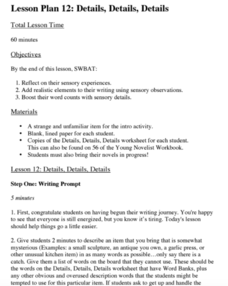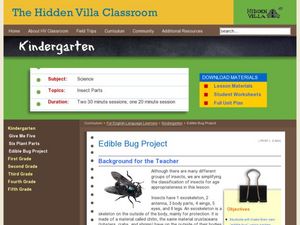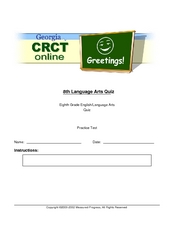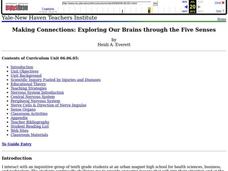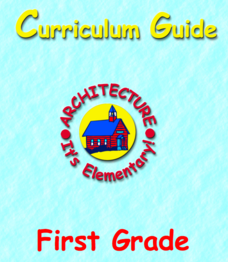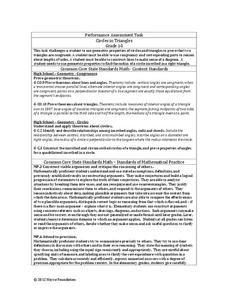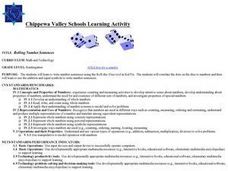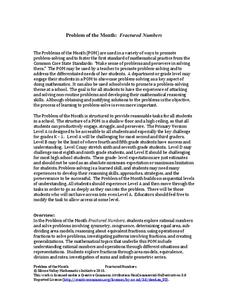Curated OER
Brain and Senses
Students investigate the brain through multiple senses. In this biology activity, students experiment with different activities involving taste, memory, touch, and sight to understand how the brain works. Students work in partners and...
Curated OER
Using My Senses
Students observe crickets in the terrarium. Have them record in their journal any evidence of crickets having senses. Then they answer questions like these: How do they use their sense organs? Where are they are located?
Curated OER
The Five Senses - Observation, Experimentation, Prediction, and Categorization.
First graders engage in this creative and well-designed lesson. They rotate through five learning stations, each devoted to one of the senses. They practice observation, experimentation, prediction, and categorization.
Curated OER
Touch-Drawings
Students explore an object without seeing it then draw what s/he felt. In this touch-drawings lesson, students partner and place objects in a paper bag so the other person cannot see it. Then students use their hands and imagination to...
Curated OER
Basic Safety Practices
Learners demonstrate an awareness of how to use basic safety practices accordingly. They classify substances that are safe and unsafe to taste and touch. In groups the students explore different substances and explain how they are safe...
Curated OER
Shells: An Investigation
Students observe shells using their five senses. In this scientific inquiry lesson, students examine shells using a hand lens and their five senses. Students complete an included shell data sheet.
Curated OER
Details, Details, Details
Writing can become one-dimensional if authors don't involve all their senses. First, scholars observe a strange object which, ideally, they can touch and even smell. Without using certain words (you can create a list or have the class...
Curated OER
Edible Bug Project
Students recognize the characteristics of insects. In this edible bugs lesson, students observe the body parts of an insect. Students create an edible insect using a grape, carrot sticks and sorrel stems and leaves. Students share the...
Brooklyn Children’s Museum
Inside India
What can a Ganesh statue, hand ornament, and print block tell you about India? Introduce your learners to the geography, history, and culture of India by analyzing primary sources and using the well-designed worksheets provided in this...
Curated OER
Textures Are Everywhere
Students take a walk outside and use the sense of touch to discover textures in their world. They record their observations and compare their observations with those of their classmates.
Curated OER
Georgia CRCT Online: 8th Language Arts Quiz
Review word choice and grammar skills with this practice test for the Georgia Criterion-Referenced Competency Test (CRCT). Fifteen multiple-choice questions prompt eighth graders to recall writing strategies, grammar skills, and...
Institute of Electrical and Electronics Engineers
Be a Scanning Probe Microscope
Extensive reading is done in order to learn about scanning probe microscopy and nanoscale. Afterward, individuals use a pencil to probe an unidentified object that is inside of a box so that they cannot see it. Using only what they could...
Dick Blick Art Materials
Mehndi Art Gloves
Class members get a chance to practice the art of Mehndi as they use markets to apply patterns to a latex glove.
Curated OER
Making Connections: Exploring Our Brains through the Five Senses
Students identify structures of the brain, and neurons and analyze their functions. In this nervous system lesson plan students create drawings and models of anatomy.
Curated OER
Physical Differences
Students read the book We Can Do It! and discuss how we are all physically different. In this physically different lesson plan, students read the book, discuss their differences, and participate in a smelling and touching activity to see...
Curated OER
My 5 Senses Book
Pupils create a 5 page My 5 Senses book. They type 1 sense on each page and select 4 corresponding pictures to go with the sense.
Curated OER
Sense-Ability
Students use comparisons, graphing, patterning, and sorting, and develop language skills as they explore the five senses.
Curated OER
Abstract Nouns and Concrete Nouns
Practice identifying concrete and abstract nouns with a learning exercise that offers three different ways to show what enthusiastic grammarians know. First, pupils read a passage and identify the nouns; second, they think up three more...
American Institute of Architects
Architecture: It's Elementary!—First Grade
Build an interest and appreciation for architecture in your young learners with this fun 10-lesson art unit. Engaging children in using their five senses, the class first observes the environment around them, paying special attention to...
Montana Office of Public Instruction
Native American Culture: Counting, 1:1 Correspondence
Kindergarteners practice showing 1:1 correspondence while incorporating information they learned about a local Native American culture. The objects used for counting are taken from the previous day's Native American instructional...
Inside Mathematics
Circles in Triangles
Challenge the class with inscribed circles in triangles. The assessment task requests class members use their knowledge of circles and right triangles to prove two triangles are congruent. They go on to utilize their knowledge of...
Houghton Mifflin Harcourt
Songwriting Skill - Elaboration: Jesse McCartney - “How Do You Sleep?”
The practice of developing lyrics by elaborating with sensory details and examples continues in the third lesson on songwriting. This time class members examine Jesse McCartney's "How Do You Sleep?" Using procedures established in the...
Curated OER
Rolling Number Sentences
Budding mathematicians investigate how to write number sentences using the Roll-the-Dice tool in "Kid Pix". They correlate the dots on the dice to numbers and then learn to use the addition and equal symbols to write number sentences....
Noyce Foundation
Fractured Numbers
Don't use use a fraction of the resource — use it all! Scholars attempt a set of five problem-of-the-month challenges on fractions. Levels A and B focus on creating fractions and equivalent fractions, while Levels C, D, and E touch on...






